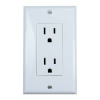Hello everyone
I have a EVGA 2000 watt power supply that takes 200 - 240 volts and 50 - 60 Hz. It uses a standard American 3 prong plug in to plug in to the wall. I am having a real struggle finding something that is compatible let alone rack mountable.

What do you guys use to protect your 240 V power supplies? Is surge protection even necessary?
I have a EVGA 2000 watt power supply that takes 200 - 240 volts and 50 - 60 Hz. It uses a standard American 3 prong plug in to plug in to the wall. I am having a real struggle finding something that is compatible let alone rack mountable.

What do you guys use to protect your 240 V power supplies? Is surge protection even necessary?